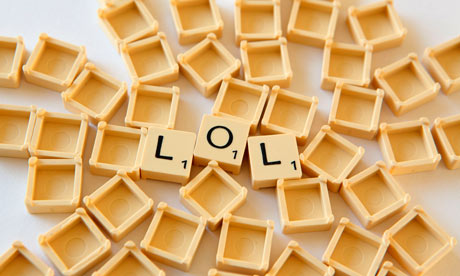
What reader could not thrill to an OUP monograph whose index catalogues arf arf, bunny-boiler, fucktard, hornswoggle, reffo, skankaroo, top banana, wowser, wha'gwaan, and zhoosh? The Life of Slang (£14.99) by Julie Coleman wears academic robes, but underneath it's only too willing to get down and dirty.
How many professors of English (Coleman teaches at Leicester university) can distinguish between a numpty and a nun's nasty, or seem quite at home with idioms such as busy as a cat burying shit? The feisty, can-do tone of her book is appropriate. As the American writer Carl Sandburg put it, "Slang is a language that rolls up its sleeves, spits on its hands, and goes to work".
Instinctively, we all know what slang is – and some people don't like it, especially when it crops up as rhyming slang, for instance berk. Anyone for whom "pure" English, which never existed, is the cat's pyjamas will be troubled and offended by slang. There are three basic reasons for this.
First, slang has always been associated with sex, deviancy and the criminal underworld. The OED has several definitions of "slang", but most of them are pejorative, as in the "language of a low and vulgar type". Only at the high end does "slang" morph into "jargon".
Second, a vigorous slang is an affront to Standard English, and always has been. For those, such as Samuel Johnson, who believe that "Language is the dress of thought", slang is knavish (1529); lewd (c 1380); ribaldrous (c 1400); tavernly (1612); billingsgate (1652); vulgar (1716), and flash (1746).
"Flash" is the third big worry for those who fear informal self-expression. Slang flourishes in the no man's land between the written and the spoken. To recognise the vigour and vitality of slang might be to concede that English is a linguistic pickpocket whose home is decorated with stolen goods. Others compare it to a vacuum cleaner, omnivorously sucking up linguistic debris.
English is, and always has been, a language of the street not the academy, and for the many not the few. Ever since the Norman conquest imposed French language and culture on the Anglo-Saxon state, English has flourished underground and on the margins. Slang is the expression of this unofficial life. Maddeningly, for linguistic conservatives, with English, as William Empson puts it, "the undergrowth is part of the language, and listed in the OED".
Professor Coleman's analysis of this undergrowth is enjoyable and succinct. Rarely, since Eric Partridge, has any scholar evinced such pleasure in the vulgar tongue. She also has an agenda. Coleman wants to have it all ways: slang is not necessarily about the uneducated, or their vulgar colloquialisms, and it's neither bad nor good.
In the exposition of this thesis, there are inevitable limitations. Slang is so intrinsically oral that nailing it to the page risks killing the thing we love. Analysing slang is like trying to pick a lock with a wet fish.
Where best might you undertake such an analysis ? If there is a slanguage laboratory – though Coleman never quite admits this – it's to be found halfway around the world, in Australia.
Nowhere will you find better conditions for a flourishing slang. Many of Australia's founding fathers were well-versed in the criminal argot of the 1800s. From the first settlements, there was an urgent need for linguistic invention to describe the astounding novelty of the antipodes. Aussie slang became integral to a huge linguistic project. What's more, there was no anxiety about innovation. In New South Wales, no one gave a stuff about the King's (or the Queen's) English. Australians of all sorts came to delight in their slang tradition.
Much of it bubbled up from the street. Some of it was made up, especially by Barry Humphries who, as "Bazza", pioneered a lot of 'Strine. Occasionally, real life surpassed his most outrageous inventions. Years ago, Humphries told me of the time he'd overheard a woman on a Sydney bus telling her friend about her recent gynaecological operation. "Well," she said, "I had the hizzie in the hozzie." Neither "hizzie" nor "hozzie" is in this book. No worries. In other respects Coleman is a top banana ("the leader in any field").
Sturm and drang hits literary Europe
The Omnivore had hardly handed out its coveted Hatchet Job trophy to Observer critic Adam Mars-Jones for his review of Michael Cunningham's novel By Nightfall before the German literary scene bounced back with a riposte in the shape of Georg Diez's review of a book called Imperium by Christian Kracht. In this Teutonic hatchet job, Diez claimed the book "shows the author's vicinity to extreme right-wing ideas", a not-so-coded allusion to Kracht's alleged sympathies. Nazism remains toxic. Not since Tibor Fischer smeared Martin Amis has a review provoked such hostility or uproar. Kracht's publishers have declared that Diez had "broken the bounds of literary criticism" and accused him of "journalistischer Rufmord" (journalistic defamation). An open letter in Der Spiegel from some literary illuminati has also warned that such an approach would mean "the end of free art". Well, maybe. The whole affair is reminiscent of Niall Ferguson's feud against Pankaj Mishra: a lot of heat, not much light.
In Byzantium the emperor's always right
The recent BBC2 account of the Crusades by Thomas Asbridge is, apparently "outdated and inaccurate", a rehash of popular mythology. No surprise that this shocking news comes from The Bodley Head, publishers of a rival volume. According to Peter Frankopan, author of this revisionist study, the Crusades were really a desperate attempt by the Byzantine emperor Alexios I to prop up his tottering regime, and outwit an army mutiny, by appealing to the pope. So, nothing to do with the infidel occupying Jerusalem. It all sounds rather Byzantine.

